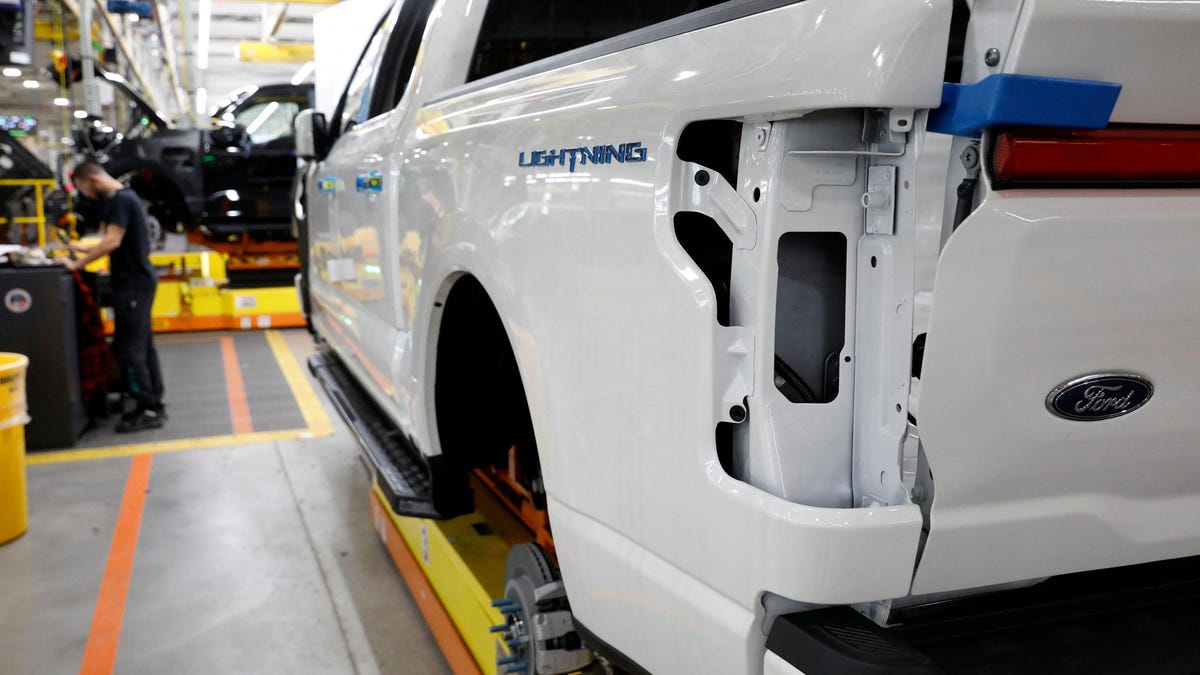Ford Delays F-150 Deliveries Due to a Shortage of Blue Oval Badges: Report

Ford Motor Co. battery powered F-150 Lightning trucks under production at their Rouge Electric Vehicle Center in Dearborn, Michigan on September 20, 2022.Photo: Photo by JEFF KOWALSKY / AFP
It’s a story that’s become familiar since the start of the pandemic and continues to this day: Ford is holding back vehicles due to a parts shortage. Mainly, the automaker has run out of its trademark blue-oval badges, along with vehicle model nameplates.
Ford is currently holding back as many as 45,000 vehicles due to parts shortages, though the automaker declined to comment on how a shortage of blue-oval badges plays into the delays. Sources told the Wall Street Journal that is indeed the case:
The car company has run into supply constraints with the brand-name badges and the nameplates that specify the model, according to people familiar with the matter. Both parts are affixed to the vehicle’s exterior and are important identifiers for the auto maker’s products. A company spokesman confirmed it has held some vehicle shipments because of a lack of badges.
The shortage is impacting Ford’s popular F-Series pickup trucks, the people said.
Ford executives had considered some workarounds, such as 3-D printing the insignia until the permanent ones could be obtained, some of the people said. But they didn’t feel the printed substitutions would meet the bar on quality, these people said.
The Ford spokesman said the company is building and shipping trucks with the blue oval badges and is retrofitting those built without a Ford logo and delivering them to dealers. The company declined to comment on the 3-D printing proposal.
Ford on Monday said it expects to have about 40,000 to 45,000 vehicles in inventory at the end of the third quarter that couldn’t be shipped to dealers because they were awaiting needed parts. Many of these vehicles are high-margin trucks and SUVs and the shortages primarily involved parts other than semiconductors, the company said.
WSJ suggests this delay may be due to some recent production problems involving a Ford supplier: Tribar Manufacturing. The company fabricates badges and model nameplates at its facility in the Detroit suburb of Wixom, Michigan. It counts some of the biggest automakers in the world as its clients, not just Ford but GM and Toyota as well.
On July 29, Tribar overwhelmed the local water treatment plant with contaminated water tainted with 5 percent hexavalent chromium, a known cancer-causing substance. An employee at Tribar overrode alarms a staggering 460 times in three hours. The poison-laden water was potentially released into an essential waterway at the very height of summer in the densely populated Metro Detroit region. State agencies then accused the company of complicating its investigation of the spill. Thousands of residents were put under no-contact advisory, barred from recreational activities around the river.
G/O Media may get a commission
At least two spots in the Huron River waterway tested positive for elevated hexavalent chromium, but levels were still within limits for fish and wildlife safety. No more chromium has been found despite repeated testing. Tribar credits its own filters and the water treatment plant for catching the hazardous chemical, WSJ reports. The factory is now running at full strength. Tribar Manufacturing confirmed Ford is currently a client, but declined to give any further information on whether the spill contributed to a shortage of parts from its factory.
This wasn’t the first time Tribar had poisoned the waterways the Huron River waterways. The company was responsible for releasing an “astronomical” amount of PFAS into the water, leading to a years-long, perhaps permanent “do not eat” order on fish caught in waterways fed by the Huron River.



